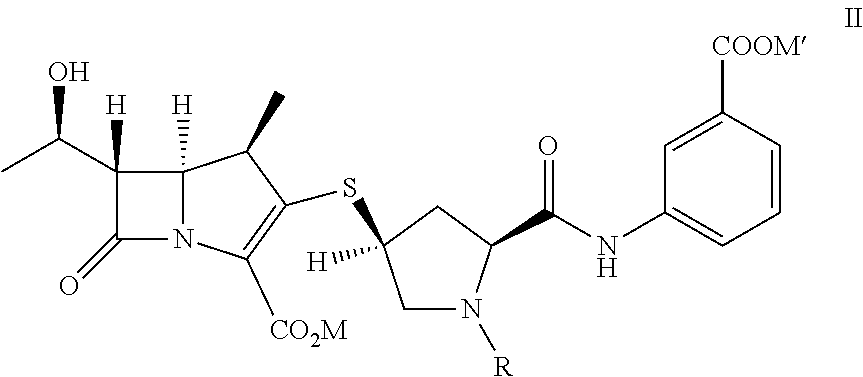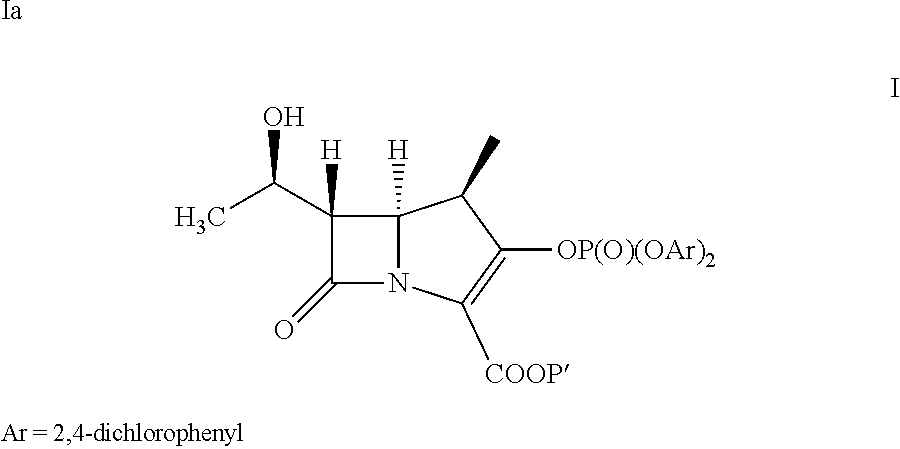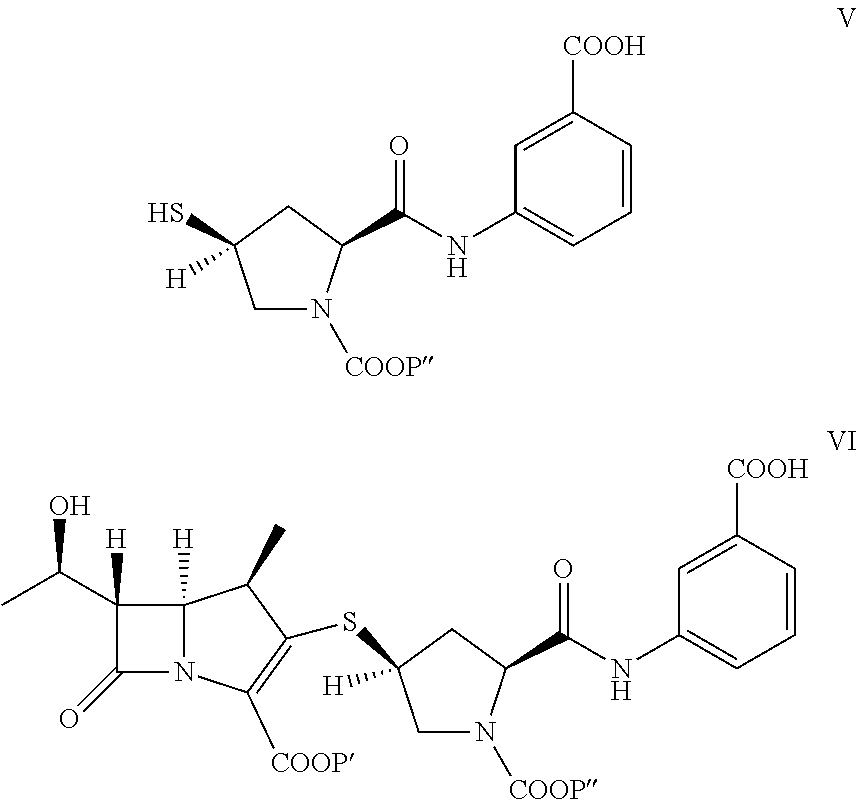Process for the preparation of carbapenem using cabapenem intermediates and recovery of cabapenem
a carbapenem and intermediate technology, applied in the field of carbapenem preparation using cabapenem intermediates and recovery of cabapenem, can solve the problems of unstable product, new untreatable bacteria, and process for deprotecting mono-protected bacteria, so as to improve the effective yield, reduce the generation of impurities, and novel
- Summary
- Abstract
- Description
- Claims
- Application Information
AI Technical Summary
Benefits of technology
Problems solved by technology
Method used
Image
Examples
example 1
A) Preparation a Compound of Formula Ia
[0052]The compound of formula III (43.2 g) is slurried in DCM (777 ml). Followed by adding Rh2Oct4 (145 mg) to the solution. The mixture is heated at reflux for 7 hours then distills the resulting solution to remove 4-Dicyanomethylene-2-methyl-6-p-dimethylaminostyryl-4H-pyran (DCM, 388 mL). The compound of formula IV in dichloromethane solution is cooled to less than −35° C. The bis(2,4-dichlorophenyl)chlorophosphate (71.3 g) and the mixture of diisopropyl ethylamine (17.63 g) and 4-dimethylamino pyridine (40 mg) in DCM (43 ml) are added to the reaction solution at less than −35° C. The reaction solution is aged for 2 hours. Then extracted it by 1% HCl(aq)(100 mL) and 5% NaHCO3(aq)(100 mL) at 0˜5° C. The resulting dichloromethane solution is obtained as a compound of formula Ia and taken for Example 2A, 4A and 4B.
B) Preparation a Compound of Formula Ib
[0053]The compound of formula III (43.2 g) is slurried in DCM (389 ml). Followed by adding Rh2...
example 2
A) Preparation of a Compound of Formula VI from Formula Ia
[0054]To provide p-nitrobenzyl(1R,5S,6S)-6-[(IR)-1-hydroxyethyl]-2-[(bis(2,4-dichlorophenyl)phosphono)oxy]-1-methylcarbapen-2-em-3-carboxylate of formula Ia in dichloromethane (500 mL) from Example 1A at −30° C., 3-([[(2S,4S)-mercapto-2-pyrrolidinyl-1-(4-nitrobenzyloxy)carbonyl]carbonyl]amino]benzoic acid (44.7 g) was added. To the reaction mixture, diisopropylethylamine (41.0 g) was added at −30° C. and stirred. After completion of reaction water (500 mL) were added to resulting mixture into, stirred, and separated. The organic layer was obtained to yield the compound of formula VI and taken for subsequent step described in Example 3A and 3B.
B) Preparation of a Compound of Formula VI from Formula Ib
[0055]To provide p-nitrobenzyl(1R,5S,6S)-6-[(IR)-1-hydroxyethyl]-2-[(di-phenylphosphono)oxy]-1-methylcarbapen-2-em-3-carboxylate of formula Ib (119 g) obtained from Example 1B in acetonitrile (560 g) at −5° C., 3-([[(2S,4S)-mercap...
example 3
A) Preparation of a Compound of Formula II, R═H
[0057]The compound of formula VI in dichloromethane solution from Example 2A was added to the 10% Pd on carbon (48 g) with purified process water (648 mL) and sodium bicarbonate (37.2 g) at 20.0° C. Conduct hydrogen gas replacement twice for the nitrogen in the reactor. Then adjust the pressure from 25 psi to 80 psi during first one hour under hydrogen. Control reaction temperature was at 20° C. for 4˜5 hours. Cool down the reaction temperature to be less than 10° C. Then adjust the pH value to about 5.0 with 5% HCl. Filter 10% Pd / C out and separate aqueous layer. The pH value of the aqueous layer was adjusted to be about 6.50 and then extract by adding dichloromethane (about 1 kg). n-Butanol (3 kg, 2 kg) is used to extract the resulting aqueous solution twice at 0˜5° C. The aqueous solution is filtered through 0.22 μm filter. Isopropanol (66 ml) is added to concentrated aqueous solution (330 ml; ˜100 mg / ml) at −2 to 5° C. Then cool to ...
PUM
 Login to View More
Login to View More Abstract
Description
Claims
Application Information
 Login to View More
Login to View More - R&D
- Intellectual Property
- Life Sciences
- Materials
- Tech Scout
- Unparalleled Data Quality
- Higher Quality Content
- 60% Fewer Hallucinations
Browse by: Latest US Patents, China's latest patents, Technical Efficacy Thesaurus, Application Domain, Technology Topic, Popular Technical Reports.
© 2025 PatSnap. All rights reserved.Legal|Privacy policy|Modern Slavery Act Transparency Statement|Sitemap|About US| Contact US: help@patsnap.com



